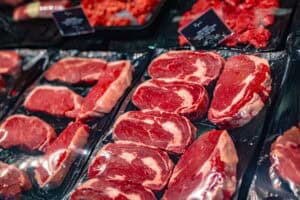The world is increasingly moving toward a plant-based diet with some already becoming avowed 'Flexitarians'.

It feels like sacrilege in South Africa, where meat and the cooking of it is often seen to be a backbone of all our cultures, but the worldwide move to meat-free proteins is in full swing.
Derived from sources such as soya, peas or beans, synthetic products aimed to mimic the properties of meat are being manufactured without using animals and it seems the business is booming.
In America, Tyson Foods, one of the world’s largest poultry, beef and pork producers, plans to start selling a meat substitute within the next few months. The product is set to initially enter the market “on a fairly limited basis,” but will be rolled out “on a much larger scale” before the end of the year.
With demand being driven by consumers choosing healthier diets and trying to reduce their impact on the environment, the US meat-substitute retail market is expected to reach $2.5 billion by 2023, according to the research firm Euromonitor International. Meanwhile, Beyond Meat, a plant-based meat company, started publicly trading in the US on May 2, and the stock more than doubled in value right out of the gate.
In Canada, the CEO of a multimillion-dollar meat company Maple Leaf Foods, stunned the markets when he explained they were now a “protein company”.
“We’re committed to both animal proteins and plant-based proteins,” said Michael McCain, CEO of Toronto-based Maple Leaf Foods. The company has recently invested more than $600 million in the new and growing segment of the food business. In the past, meat substitute sausages and foods have often been a poor replacement for carnivores, determined to keep vegetables as a side dish, but as the potential for making money increases, so too does the research spend, and newer products are increasingly being able to please even the most hardened of meat lovers.
A variety of options
Impossible burger and Beyond Meat are the most advanced upgrades to veggie burgers that taste (and in the case of Impossible actually seem to “bleed”) just like ground beef. Beyond Meat uses pea protein isolate as its primary source of protein, and Impossible Burger recently reformulated to use soy and potato proteins. The downside is that the flavour in both cases comes from huge doses of saturated fats derived from coconut oil.
The Beyond Burger has five grams of saturated fat (25% of your recommended daily limit) per serving, while the Impossible Burger has eight grams per serving—a whopping 40% of your daily limit. While early veggie burgers were almost exclusively purchased by vegetarians, 93% of Beyond Meat customers buy regular meat too — suggesting the company has succeeded at making something that appeals to meat eaters.
Other healthier, but not quite as “meaty” examples include Jack fruit, the South Asian fruit that when underripe, has a neutral flavor and a texture similar to pulled pork, Seitan, which is made from gluten – more marketably called wheat protein, and tempeh, which is made from soy beans that are soaked and softened, then cooked, slightly fermented and formed into a firm block.
Each of these alternatives currently come with a downside. Jack fruit isn’t actually very high in protein, Seitan is not a complete protein and is lacking the amino acids lysine and threonine, while tempeh will trigger those with soy allergies.
Moral choices
There are a number of reasons why the trend toward plant-based diets is growing. Fans often cite moral concerns around the well-being of animals, as well as the environmental benefits of trimming down on eating beef specifically. Animal-based proteins — especially red meat — consume more resources and generate more greenhouse gases than nuts, beans, and other plant-based proteins.
A recent report from World Resources Institute, a global sustainability think-tank, found that producing beef uses 20 times the land and generates 20 times the emissions compared to growing beans, per gram of protein. Market researchers refer to a “halo effect” when speaking about today’s plant-based foods.
“We’re dealing with a much more educated consumer who understands more about the foods that they’re eating overall,” said Robert Carter of the NPD Group on an interview with CBC. “They’re looking for that perception of health and wellness, and these plant-based burgers really tie into that.”
There are numerous signs that this trend to a more plant based diet has hit the mainstream. The movement has coined a new phrase ‘Flexitarian’, which describes people who are happy eating some vegetarian meals and others that include meat and, after a short test period, hamburger chain, Burger King, has announced it will be rolling out their whopper made from plant-based, “Impossible meat” nationwide in the US.
But this isn’t the end of development for non-animal based proteins.
Cultured meat
Within the next five years, the American Association for the Advancement of Science has suggested we could also be eating a lot more “cultured meat”. A fairly new concept, “cultured meat” refers to the concept of meat that is produced via cell structure, rather than from a slaughtered animal.
The technology was developed as a sustainable way to produce animal-based proteins without having to sacrifice animals. The procedure requires the extraction of stem cells from a donor animal, which then proliferate to produce animal tissue structures. Unfortunately, meat-culturing has presented challenges which have resulted in fairly slow uptake of the process, but these problems are expected to be overcome in the very near future.
For more news your way, download The Citizen’s app for iOS and Android.
Support Local Journalism
Add The Citizen as a Preferred Source on Google and follow us on Google News to see more of our trusted reporting in Google News and Top Stories.








